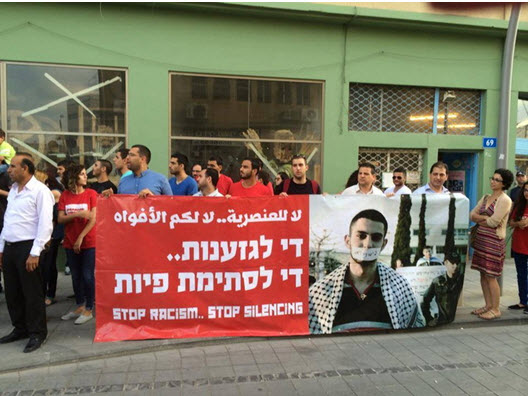On Monday, March 9, the Supreme Court ordered the University of Haifa to revise a bylaw which limits political activity on campus, overturning the decision of a lower court. Justices Esther Hayut, Hanan Melcer, and Neal Hendel said that university policy constituted a gross violation of freedom of expression on campus. The school has 60 days to submit a new version of the bylaw for review.

Demonstration in Haifa, last summer, for freedom of expression at the university. Among the demonstrators: the head of the Joint List, Ayman Odeh and members of the Central Committee of the Communist Party of Israel (Photo: Al Ittihad)
Article 6.2, authorizes the university president to “halt or prevent any public activity for a limited time,” after consulting with the rector, the dean of students and the vice president for administration. It defines “public activity” as “any political, social, cultural, entertainment or academic activity (excluding instruction), including rallies, demonstrations, lectures, film screenings, the distribution of posters and erection of booths and any other public activity excluding those conducted by university departments.”
In November 2012, during “Operation Pillar of Defense” in Gaza, the university used this bylaw to prevent Hadash students from organizing on-campus public activity during a period of two weeks. This suspension followed two peaceful demonstrations on campus: one against the war, the other by students who supported the operation.
Students and faculty members, aided by the Association for Civil Rights (ACRI) in Israel, sued the university. In January 2014, the Haifa District Court upheld Article 6.2, saying it did not disproportionately restrict free speech. The plaintiffs appealed the ruling to the Supreme Court.
According to ACRI, in the four years since the bylaw was adopted, the university has repeatedly used Article 6.2 to silence specific political activities, including demonstrations during Israeli military operations in Gaza in 2009 and 2012, protests against the raid of a Turkish-sponsored flotilla to Gaza in 2010, and events organized to commemorate Nakba Day in 2011. During last May, the university prohibited activities of student groups from Hadash and Sons of the Village until the end of the academic year for holding an unauthorized protest.
“In recent years, there’s been a clear trend toward undermining students’ freedom of expression at the University of Haifa, and especially attempts to silence minority opinions on campus,” said ACRI lawyer Sharona Eliahu-Chai, adding, “Freedom of expression is a fundamental element of democratic life.”


